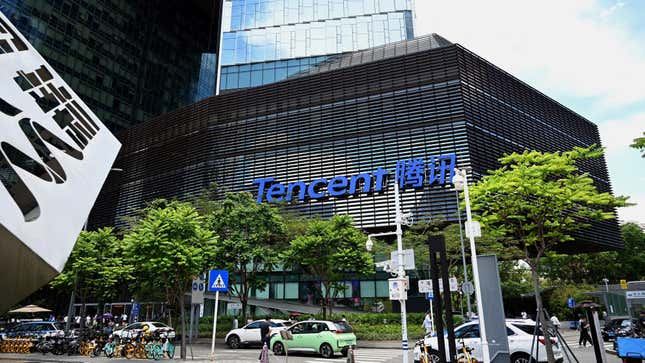
Shenzhen, China-based gaming giant Tencent has announced it will use a face recognition system to prevent minors in its home country from playing video games late into the night.
Tencent is attempting to keep ahead of recent regulations designed to stamp out what the Chinese government defines as excessive and unhealthy gaming habits. In 2019, China passed a law ostensibly intended to prevent minors “from indulging in online games.” According to NPR, that includes a ban on minors playing video games from 10:00 p.m. to 8:00 a.m., as well as limiting their playtime to 90 minutes a day. The law also prohibited minors from spending more than $28 to $57 a month on micro-transactions. New rules requiring all individuals, regardless of age, to register for games using their real identities and prohibiting citizens from playing games that include “sexual explicitness, goriness, violence, and gambling” were also implemented.
At the time, NPR reported the State Administration of Press and Publication and the Ministry of Public Security said they were collaborating to build a “unified identification system” for games. Tencent is one of the many Chinese tech companies involved in enforcing their government’s draconian censorship laws which prohibit a wide range of speech considered sensitive by authorities. But it’s also been on the other end of the stick, as when it lost out on massive amounts of revenue due to a regulatory moratorium on licensing new games in 2018.
Digital Trends reported that Tencent refers to the new system as “Midnight Patrol” and says it scans the faces of players and compares the result against a database of faces and names. Users flagged as minors will then be locked out of games whenever they have played for the maximum amount of time or attempt to play during prohibited hours. Tencent also said in a release that adults will be able to simply submit another face scan if they are mistakenly locked out. Chinese authorities could presumably choose to hoover up face recognition data from Tencent into the social credit system emerging around the country.
More detail on the face recognition comes via Sixth Tone, a Chinese state-owned media outlet aimed at Westerners. Sixth Tone cited several factors as justification for the system, such as alleged thefts by teenagers looking for microtransaction funds to reports that young people in China spend considerable amounts of time at internet cafes (one of the only ways many people in China can afford to play games that run on expensive computer hardware).
“We will conduct a face screening for accounts registered with real names and that have played for a certain period of time at night,” Tencent Games wrote in a machine-translated press release. “Anyone who refuses or fails the face verification will be treated as a minor, and as outlined in the anti-addiction supervision of Tencent’s game health system, and kicked offline.”
Sixth Tone also cited an account executive in eastern Jiangsu Province, Chen Lina, as stating “Facial recognition is a welcome sign because real-name verifications cannot keep kids out of the games.” The site also quoted WeChat users allegedly upset about the Midnight Patrol system:
However, not everyone seems happy about the news, with many of the platform’s underage users expressing their dissatisfaction under the company’s announcement on social platform WeChat.
“As a minor, I’ve been caught,” one user commented. “This is such desperate news for us high school graduates who are two months away from being 18,” another wrote.
Tencent will initially include some 60 games as part of the program, but according to Digital Trends, the list does not include one of its most popular esports offerings, Riot Games’s League of Legends. In 2011, Tencent bought 93% equity in Riot Games, and it acquired the remaining 7% a few years later; it also introduced its own mobile knockoffs of the esports title.
China is considered one of the world’s largest gaming markets, with consultancy firm Niko Partners estimating that its gaming sector will reach 781 million gamers and revenue of $55 billion by 2025. Tencent, which also owns messaging platform WeChat, holds a massive share of that market and posted 43.6 billion yuan (over $6.7 billion) in overall gaming revenue in the first quarter of 2021.
That revenue is in part due to the coronavirus pandemic, during which the Chinese government implemented stay-at-home orders and other restrictions, and was achieved despite the growing wariness of a regulatory crackdown in China’s tech sector. According to Reuters, sources said on Tuesday that the State Administration of Market Regulation rejected Tencent’s proposal to merge China’s top two videogame streaming sites, Huya and DouYu, citing failure to resolve antitrust concerns.